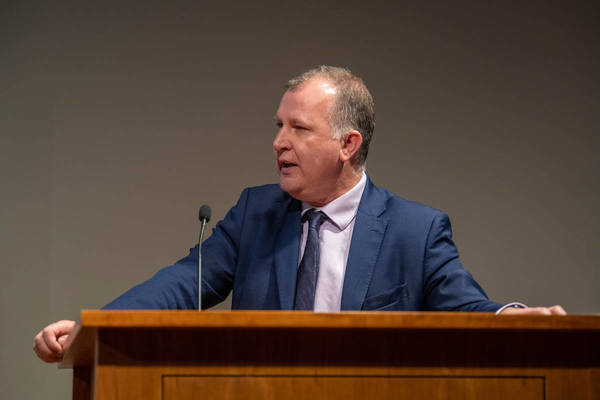
Gary Murphy is Professor of Politics at Dublin City University. He was DCU’s first Dean of Graduate Studies (2007-2011) and the Head of the School of Law and Government between 2012 and 2018.
Professor Murphy has published extensively on the politics of modern Ireland. His book Electoral Competition in Ireland since 1987: The Politics of Triumph and Despair (Manchester University Press, 2016) was widely seen as a major reinterpretation of modern Ireland over the last three decades. He is also a renowned authority on the regulation of lobbying and is co-author of the book Regulating Lobbying: A Global Comparison (2010, 2nd edition 2019). His book on Fianna Fail leader and former Taoiseach Charles Haughey will be published by Gill Books in November 2021.
Professor Murphy is a former editor of Irish Political Studies, the leading journal of political science in Ireland. He was President of the Political Studies Association of Ireland from 2009 to 2012 and appears regularly in the Irish print and broadcast media as a commentator for elections in both Ireland and the United States.
Professor Murphy was a Naughton Fellow and Distinguished Visiting Professor at the Keough Naughton Institute in 2016 and 2019.
At an event at the Institute in late November 2019, he moderated a panel discussion on Brexit’s impact on Ireland, north and south, as well as the role of the United States in the region. Taking place in a packed auditorium and called “Ireland at the Crossroads,” it featured Katy Hayward (Queen's University Belfast); Enda Kenny, Taoiseach of Ireland, 2011-2017; and Daniel Mulhall, Ireland’s 18th Ambassador to the United States. As it turned out, this was the last large event and reception the Institute hosted before the pandemic forced cancellations and closures in early March.
From a slowly re-opening Dublin, Professor Murphy answers our Three Questions.
_____________________________________
What are you working on?
I am just finishing up the editorial queries on my long-awaited—well, long-awaited by me anyway—biography of the former Irish Taoiseach, Charles Haughey. I have been working on this biography for over half a decade, and it will finally be published later this year by Gill Books. Haughey himself was anxious that an Irish publishing house would publish the first biography based on his personal papers, which I have had unique access to for my work, and I could not be in better publishing hands. My biography is the first full-length, cradle-to-grave biography of the figure who was at the centre of Irish politics for over three decades (from the early 1960s to the early 1990) and also benefits, I think, from the close to a hundred interviews I have undertaken with his family, friends, political allies and rivals, and his civil servants.
I have been consumed by Haughey's life for years now, and I hope this book will do justice to a complex and divisive figure who, fifteen years after his death, still casts a long shadow over Irish life. Haughey had a link with Notre Dame. He visited the campus in May 1991, when he was conferred with a Doctor of Laws Honoris Causa. The citation for Haughey's honorary doctorate ended by saying: "May his legacy be the gift his own generation has never known—Ireland at peace."
And while Ireland, thankfully, is at peace, Haughey's own legacy is far more complicated. After he left office, it was revealed that he had received vast sums of money from a variety of businessmen to fund his lavish lifestyle and led him to spend his final years as a virtual recluse in his Gandon mansion on the northside of Dublin.
I benefitted greatly in thinking and writing about Haughey during my two stays at the Keough-Naughten Institute in 2016 and 2019 and look forward to returning to campus to place a copy of the book in the Institute's library.
What are you reading?
I've just finished two extraordinary novels: Maggie O'Farrell's Hamnet, her wonderfully evocative, imaginary treatment of the life and death of Shakespeare's son, who inspired Hamlet, and Donal Ryan's Strange Flowers, the latest in his brilliant series of works exploring life in modern Ireland. He is, in my view, the great chronicler of modern Ireland in all its intricacies and messiness.
On the work front, I'm enjoying the latest volume in the How Ireland Voted series of election books, which date back to 1987. How Ireland Voted 2020, edited by Michael Gallagher, Michael Marsh and Theresa Reidy, which has just been published by Palgrave, offers the definitive guide to the most extraordinary election in the history of the Irish State. My opening chapter on the background to the election sets the scene for an election which has transformed Irish politics.
What, during the pandemic, are you missing?
I miss being able to attend live sporting events. Some of my most treasured memories of my times at Notre Dame were of being in the crowd for Saturday football games. I miss watching my beloved Cork hurlers play in Thurles on a hot Sunday in July. There's an old saying: "Being There" which sums up the communal spirit of watching live sport, and I look forward to being there soon again.
I miss my friends and extended family. I have a nine-month-old granddaughter who lives in New York and who I've never seen in the flesh. Meeting her is the great anticipatory event of my life.
Previous installments of "Three Questions":
April 2021: Professor Enrico Terrinoni, Università per Stranieri di Perugia
March 2021: Professor Jennifer Todd, University College Dublin
January 2021: Professor Ailbhe Darcy, Cardiff University
December 2020: Professor Daniel Carey, National University of Ireland Galway
November 2020: Professor Sonja Tiernan, University of Otago, New Zealand